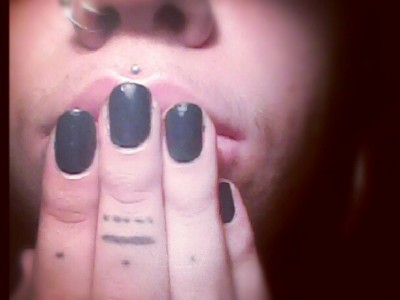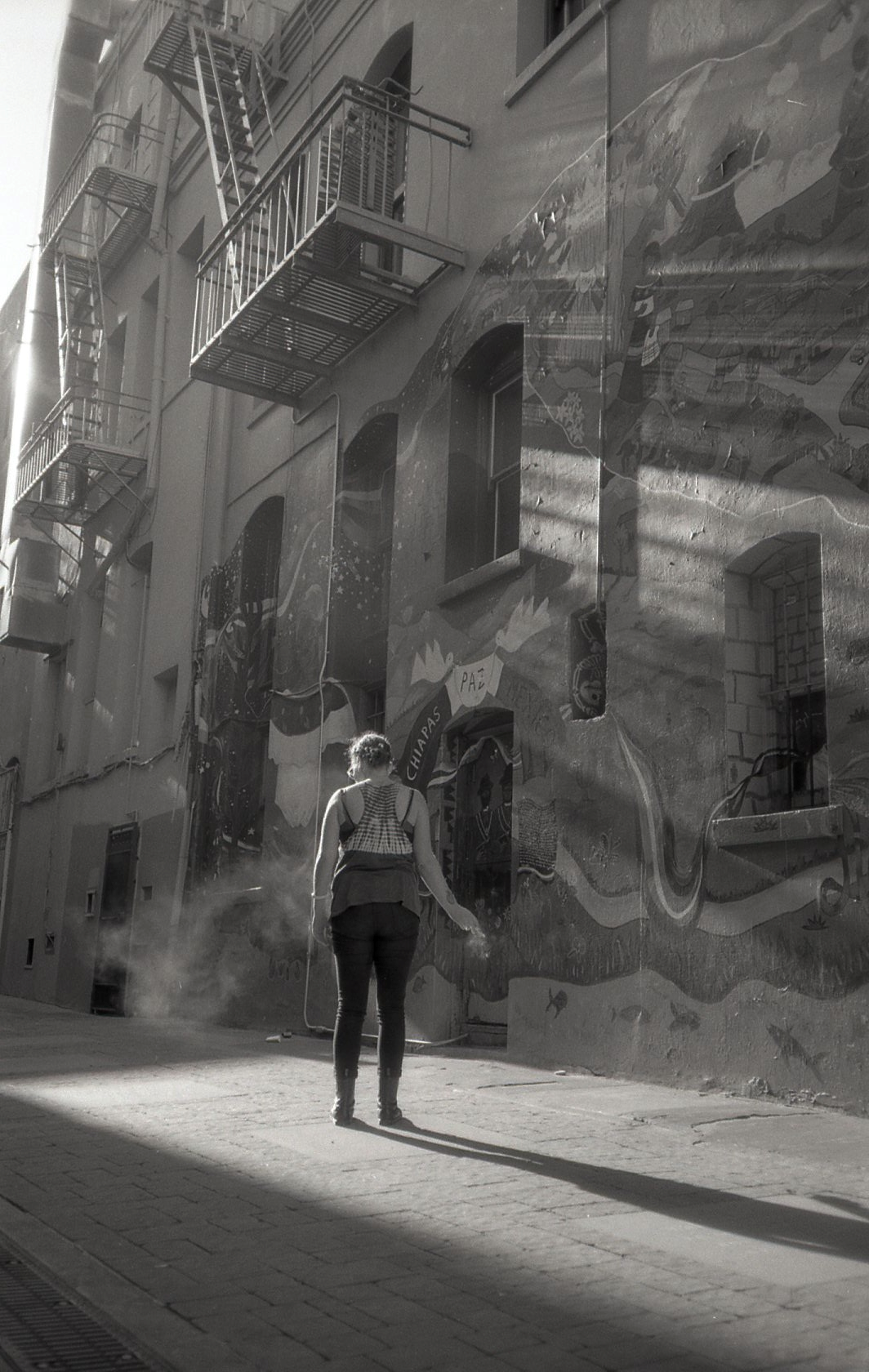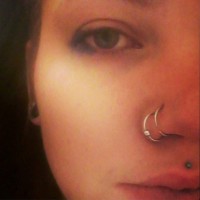Featured Writer Nina Rockwell has remained a part of the Portland literary scene even after moving to rural Missouri, where she works and lives among fashionably decorated beetles and long-legged spiders. We asked fellow Portlander and Issue #1 Featured Writer Jenny Forrester to interview Nina. Nina wowed the audience at her first-ever reading with a flawless performance at Unchaste Readers, the SE Portland music and literary event hosted by Jenny every other month.
First of all, Nina, I miss you. I hope you’re writing like an Unchaste woman.
Jenny! I was so excited when I learned you were doing the interview! I miss you, too. Life isn’t the same without you around. Writing like an Unchaste woman? I would say I am — at least when there aren’t small children running through my room begging me for fruit snacks. These days my writing is spliced together with teaching a four-year-old how to read, doing kitchen science projects (right now we’re growing sugar crystals), and setting up DIY water slides.
You write Portland with a wild awareness of the landscape. What do you draw from to paint this city so well?
I was born and raised in Portland. Aside from a couple of relocations I spent the first twenty-three years of my life there. I never learned how to drive a car so I rode my bicycle and took public transportation everywhere. This gave me a different view of the landscape than other people who chose to drive. Living in the same town for so many years and going to high school in central downtown gave way to meeting a vast number of people all throughout the city limits. I have specific memories with people on almost every street corner of Portland. So many of these memories bring up a lot of emotion and nostalgia. Say the sun reflects off of the windows of a passing MAX train while my high school best friend tells me some dirty and tragic secret — the sun’s reflection shining into my eyes intensifies that. It’s too visceral and multi-sensory to leave out of the stories.
The sexual energy of your writing evokes such emotion – what sort of feedback do you get from audiences and readers?
I get far more positive responses than I thought I ever would. When I read a completed story back to myself I sometimes think, “Shit. Is this going to be a trigger? Or is this going to offend someone?” Then I snap out of it and remember that when it comes to writing my truths I can’t concern myself with placating others so they can feel more safe. I wasn’t raised to hide behind the screen of Calm and Nice and Safe. Someone told me once that if you aren’t pissing people off you aren’t living an honest life. Even though I’m pretty sure he was kidding, I agree with that wholeheartedly.
I’ve had mixed feedback. Once person in response to a piece I wrote about the lasting effects of early-age sexuality and domestic abuse told me I may have saved her marriage while another person — in response to the same piece — told me I was selfish and self-serving. Sexuality is a difficult topic; it opens a mixed bag.
Occasionally I wonder what middle America readers (if they exist) think of me. In all of my radical, queer, rioting, sex-before-marriage having, rapist-outing, short haired wild card glory. I’d love to sit down with the female youth of that part of the country and tell them “I made a lot of bad decisions, I’m not perfect by any means, and hear it from me: Consensual sex is sexy and healthy and your desires should never be shamed.” I wish someone would have told me that when I was starting to think about sex.
You often walk the line of political incorrectness while also maintaining your integrity as a seeker of social justice and as a loving person. How do you do this?
Sometimes even the most loving and socially aware people have to color outside the lines. Practicing actual Political Correctness is so hard for me because in the Portland social scene it’s almost offensively regulated. Like, addressing a group of mixed gendered people as “Guys” is unimaginable because you have to think of the pronouns of all people involved even if you’re just saying “Hey Guys, lets get some food.” Casual speech is almost entirely ruled out. I choose to speak and write in ways I know I would feel respected by while still staying honest. I keep my heart focused toward my social and political beliefs. I try to carry that through into my writing without alienating people.
Many great American writers were (and are) southerners. Has living in another part of the country changed your writing?
Well, aside from the Brown Recluse spider bite I got in my armpit that forced me to type with one hand for a week? Absolutely, and in a few different ways.
I recently moved to a ten-acre farm outside of Columbia. Not only does the landscape here evoke different emotions, but my focus has changed. My atmosphere has shifted. Portland was too comfortable for me to face the most painful and ugly pieces of my history. I had to separate myself from it. The metaphorical gutter that we occasionally have to lay down in to get our work done — that looks a lot different now. For “The Old Crow’s Dark Eyes” it was a stuffy and creaking motel room in Hays, Kansas. For the story I am working on now, it’s my spider-filled studio. For the next one it may be the dock on the lake by my house.
The title “The Old Crow’s Dark Eyes” is gorgeous. How do you choose your titles in three words or less?
Oh, thank you. That title took me WAY too long to figure out. Three words for my titling process? Gosh… Lots Of Wine! (Just kidding, Mom.) Really though, Not Without Help.
I’m lucky enough to have some wonderful people around who aid in my inspiration.
In the piece, you write about the symbolism of the swastika. How brave do you have to be to do that?
We all know what a swastika is, right? It’s terrifying; it instills fear and historically influenced PTSD. It also represents centuries of heavily studied cultural symbolism (for peace and balance! Notice that the swastika is symmetrical — balanced). Not enough people nowadays care about its original meaning. I don’t know if bravery is what makes it possible for me to write about its history. I think it may be more of a thrashing desperation. It comes from a hope for education rather than terror. Maybe hope isn’t the right word.
How do you decide whether you’re going to write memoir or fiction on a given day?
It depends on how I’m feeling. Some days I really struggle with fictional creativity so I write bottom-of-the-bottle truth. Some days I feel extra creative and usually on those days I also feel like getting revenge. I mostly write memoir, and when I write fiction I draw from actual experiences. Often those experiences were times where I felt wronged in some way. These days I’ve been orchestrating my alter-ego’s arson attack on a house I lived in when I was a kid. It makes me feel slightly better about that time of my life, and this way I finally have my chance to retaliate without actually hurting anyone or really burning down someone’s house. Also, some days I want to write something I know my mama would be able to read without having a heart attack. Those days are for fiction.




